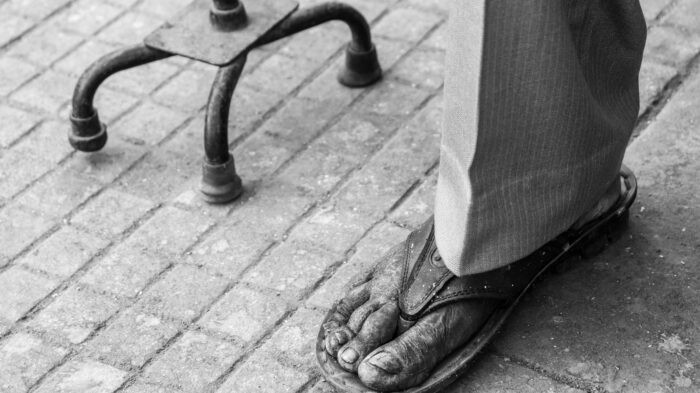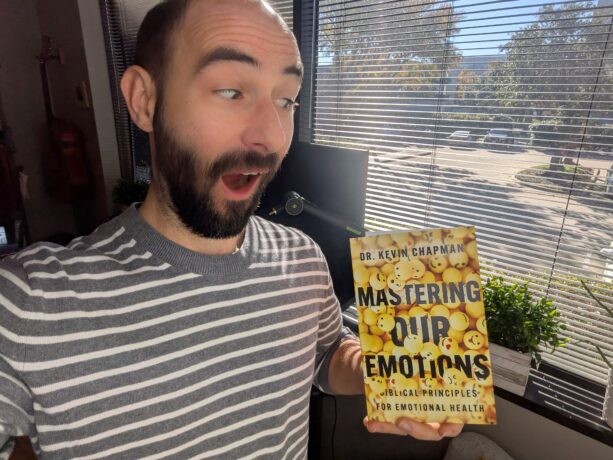
Peter’s Paradox
Peter* came to counseling and admitted he was overly obsessive about faith matters- and that obsessing itself caused problems. But he couldn’t break free. He acknowledged the classic paradox of OCD: insight outside of the moment to see that his behavior was unreasonable, but simultaneously doubt and lack of insight during severe periods of doubt.
For example, he apologized to others after every Sunday service and during his Bible study for some comment he made or the way he appeared. If he didn’t appear interested enough in another person, he felt guilty and thought he was sinning– “I wasn’t manifesting the fruit of the Spirit.” Afterwards, he would review if he felt joy, peace, patience, kindness, etc., which involved mental review of interactions- trying to ascertain his feelings and intentions. On his worst days, he thought he had sure proof he wasn’t a believer in Christ and would be told the words upon his death: “Depart from me; I never knew you” (Matthew 7:23).
In the moment, he felt so distressed that what he could admit ‘on paper’ didn’t matter- he had to feel certain he was saved. This resulted in excessive Bible reading, prayer, asking friends for feedback, calling different churches and ministries to get their perspective, and oh yes, Google.
OCD and Anxiety can turn thoughts of responsibility and feelings of guilt into fact. The obstacle clients and clinicians both face is to not treat it as fact even when everything seems to SCREAM it is. It says, “ACT NOW!!” But you need to respond in a non-reactionary way- otherwise you give credit to the fear which reinforces in your brain that there is something to fear.
And The Winner Is…Not Logic
Rationality alone will not win this battle. If you try to reason with OCD and don’t do what it takes to eliminate compulsions, rituals, obsessing, etc. (which is what maintains the disorder from the standpoint of what you control), no amount of logic will help. However, some logic and thoughtfulness is needed, especially with themes and subtypes that play off of your actual beliefs (called “cognitive domains” in OCD).
Typically in research of OCD, four core obsessional subtypes are studied:
-
-
- Contamination
- Harm/Doubt
- Perfection/Symmetry
- Unacceptable Thoughts
-
The following obsessional themes typically require more “cognitive work” in Cognitive Behavioral Therapy. This can involve addressing faulty beliefs and cognitive distortions, identifying what is actually a valued belief and what is reactionary
-
- Scrupulosity/Religious OCD
- Variations of “Unacceptable Thoughts”
- Violent intrusions
- Sexual intrusions
- Pedophile OCD (POCD)
- Transgender OCD
- Sexual Orientation OCD (SOOCD/HOCD)
- Relationship OCD (ROCD)
- Philosophical/Existential OCD
- False Memory OCD
- Real Event OCD
- Magical Thinking OCD
- HOCD/SOOCD (Homosexual OCD/Sexual Orientation OCD)
- Responsibility
- Some “Just Right”/Perfectionism themes:
- Sensorimotor OCD
Logic May Not Win, But Faith Commitments Will Help- Here’s 5
Any OCD Sufferer needs to have “anchors” that they learn to hold to, no matter the waves they feel. And fortunately for Christians, we believe by faith that Christ gives us ULTIMATE hope in all things; He is the anchor of our faith (Hebrews 6:19).
Especially relevant for the anxiety sufferer, I hope this helps anyone who has felt the alarm bells of urgency to act now, when in actuality it was nothing more than a false alarm. It’s hard to bring the principles to bear in the heat of the moment, but the more grounded and practiced you are in them, the more steady you become when waves ‘rock the boat.’
Here are 5 key faith commitments.
These essential anchors in my life have helped many clients integrate their faith while treating OCD. I commit to believing:
-
- God has made clear through His Word/Spirit/Church anything I must know today (2 Peter 1:3). That which I don’t know I am to take by faith.
- If there is something I don’t know that God wants me to know, I trust he will accomplish it outside my own limited mind (Romans 8:26).
- I am fully forgiven through Jesus Christ (Psalm 103:10-14; Ephesians 1:7-10).
- It is okay to experience and feel doubt, uncertainty, or any variation of distress concerning my faith or life (Mark 9:24; John 20:25-28)- at a minimum, it is not condemned or seen as problematic, It is precisely in these times that I need to learn to act by faith, not necessarily to “feel” faith. Check out John Ortberg’s Book, Faith & Doubt for treatment of this subject.
- If I expect to be perfect in the sense of “without mistakes,’ I am believing a lie (Proverbs 26:12; 1 John 1:8; Romans 3:10, 23). I appreciate and acknowledge that I will not be complete until the culmination of all purposes of God (1 Corinthians 13:14). This, by default, means there will be ongoing ways that I continue to fall short of God’s perfection. The good news of point 3 above- forgiveness0 resonates even more, and can give an ongoing appreciation that God loves me in my weakness and failings (knowing they continue) and not when I “clean up.” This is a wild reality of Christian faith: by God’s grace alone, through faith, which then is the motivation for change (Romans 2:4). The motivation to keep seeking God for the Christian isn’t fear- fear of ‘not making the cut,’ hell, or being ‘good enough,’ because these things aren’t good enough, anyway. We are still imperfect; God is the only One who is perfect.
I hope these help you greatly- these truths have anchored my faith through intense uncertainty.
A note if you have challenges integrating the above.
You will already need to lay the groundwork below for the above to connect for you:
- Identifying you have obsessions and compulsions/safety behaviors that interfere with life, particularly concerning spiritual matters.
- Understanding that harm and problems result from compulsive reactions.
- A minimal amount of insight where you can acknowledge, at least on paper, the belief that feelings aren’t necessarily wrong/sinful/etc. It may be a faulty, disordered signal.
- Willingness to work on these problems including at least an initial, low level “buy-in” to feel in the wrong without trying to change it.
- Understanding that I am one person attempting to discuss deep topics- you must personally dig into these by faith seeking understanding- and ignore any limitations I may bring through my own humanness and imperfection.








Justin – Thank you for this post! Very helpful.
Melissa, thanks for taking time to comment; glad you found it helpful!!